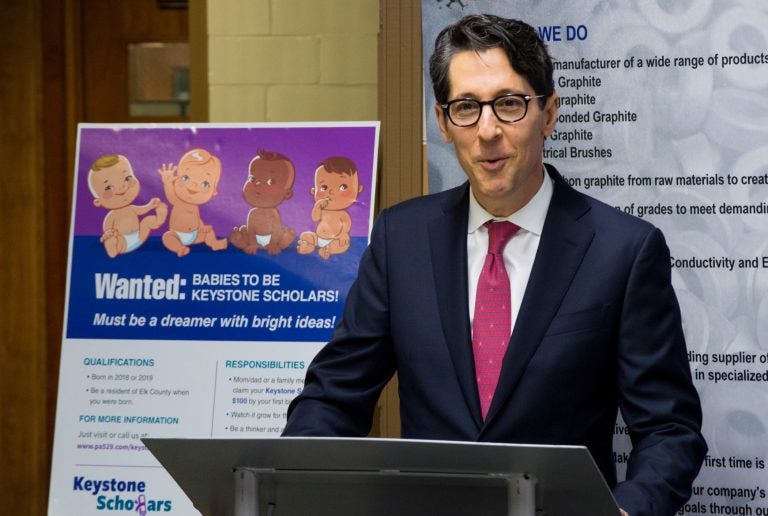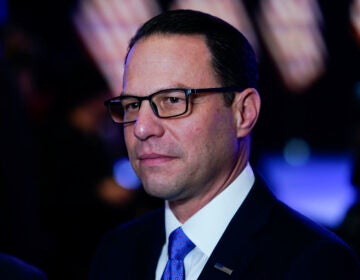New Pennsylvania college savings plan targets newborns
The purpose of providing the starter deposit is to raise awareness about the children’s savings accounts, known as 529 accounts.

Pennsylvania Treasurer Joe Torsella launches the Keystone Scholars program in Elk County, putting $100 in a college savings account for every child born or adopted there. Gov. Tom Wolf recently signed a law expanding the program to all of Pennsylvania. (PA Treasury)
Parents who have a baby or adopt next year will automatically get a $100 start from Pennsylvania toward their child’s college fund.
The state treasury launched a pilot program earlier this year, and Governor Tom Wolf signed the universal college savings program into law last week as part of the state budget.
The Keystone Scholars Program establishes a $100 scholarship grant for higher education expenses.
PA Treasurer Joe Torsella, who created the program, says the purpose of providing the starter deposit is to raise awareness about the children’s savings accounts, known as 529 education accounts.
The program is also meant to increase higher education aspirations and get more families saving earlier.
“If a child has a savings account designated for higher education, even with a very modest deposit, it makes them seven times more likely to go to and graduate some form of post-secondary education,” he said.
The statistic appears unrelated to family education level, income level or the amount in the saving account, according to the treasurer.
The state’s investment, not only evens the playing field in higher education, but is also a way to say to every Pennsylvania child, ‘We believe in you, and we’re depending on you,’ he noted.
Torsella says more college grads means a more robust state economy. He says 95 percent of jobs created since the Great Recession require some form of post-secondary education.
“Some form of higher education has never been more important now in our history, and at the same time it’s also being priced out of reach,” he said. “Pennsylvania is now number one in the country for the level of student debt that our graduates are graduating with.”
The program begins statewide next year, and families have until the child turns 29 years old to use the funds.
“It’s a program that can change your future in lots of ways and change Pennsylvania’s future in lots of ways,” he said. “It’s sort of common sense, common ground that has really been shown to work, and it is has been accomplished without costing taxpayers a dime.”
The program is funded by an investment surplus from the Treasury’s Guaranteed Savings Program and private donations.
He says only eight percent of the Commonwealth’s eligible population use 529 education savings accounts, and he hopes this will increase participation.
Pennsylvania will become the largest state to implement a children’s savings account program.
“We all are part of one Pennsylvania community and from the idea that every child –not just rich kids, not just kids in one part of the state, but every child,” the treasurer said. “Whether that child is born on a farm or in a big city, in a suburb or in a small town, in the West, in the east, in Erie, in Scranton, every child born in Pennsylvania is going to get this investment.”
The funds can be used for trade schools, vocational programs, community colleges and universities in or outside of Pennsylvania.
The bipartisan legislation was co-sponsored by State Sen. John Gordner, State Sen. Vince Hughes and State Rep. Duane Milne.
“If a family starts saving $25 a month –which isn’t a huge amount– when the child is born, it becomes over $10,000 when the child is ready to go to college or trade school, which is really significant assistance,” said Sen. Gordner.
The account will be compounded annually at the state-owned universities’ tuition rate of 4.5 percent. The $100 would be approximately more than $200 after 18 years and more than $400 by 29 years.
Torsella launched the pilot program in six counties: Delaware, Elk, Luzerne, Indiana, Mifflin and Westmoreland.
In the few months since the pilot project began, the treasury has already seen an increase in 529 accounts being opened in the pilot counties.
The pilot project is funded entirely by donations, including the Richard King Mellon Foundation, the Henry L. Hillman Foundation, the Pennsylvania Higher Education Assistance Agency Foundation and the Neubauer Family Foundation.
WHYY is your source for fact-based, in-depth journalism and information. As a nonprofit organization, we rely on financial support from readers like you. Please give today.



